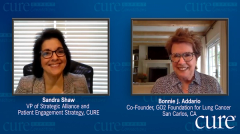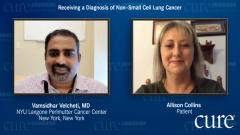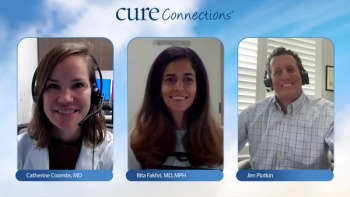
NSCLC: What Are Biomarkers and How Do They Affect Treatment?
An in-depth explanation of biomarkers in non-small cell lung cancer, particularly how they can affect the disease and treatment options.
Episodes in this series

Vamsidhar Velcheti, M.D.: Let me break down a few things for our audience. I know a lot of our audience might have gone through or are in the process of navigating this really difficult medical jargon. When we talk about lung cancer, it is really important to understand that not all lung cancers are the same. Every patient’s lung cancer is very different. As a matter of fact, every patient’s lung cancer that I saw today is different. The way they respond to treatments is different, the prognosis is different, the way the cancer spreads is also different. We are increasingly understanding the diversity of lung cancer. The more we attempt to subgroup and classify lung cancers based on their molecular or genomic fingerprinting, we can do better in terms of finding a treatment that could actually work better. Lung cancer is not the same lung cancer it was 10 years ago. Ten years ago the only thing that we had to offer patients was chemotherapy, and unfortunately the chemotherapy we used was not as effective. Chemotherapy has a role in lung cancer, don’t get me wrong, but I think we have come a long way from just treating everyone with chemotherapy and hoping that [the] cancer is going to shrink and stay controlled for some time.
Today it’s really important to understand the DNA fingerprints of the cancer. When somebody has lung cancer it is absolutely critical to do a biopsy to understand what type of mutations or genomic alterations make up the patient’s lung cancer. In general, when we talk about lung cancer we’re talking about normal lung cells that have, for some reason, turned into rogue cells that are not behaving, and dividing and spreading and causing problems. Oftentimes it happens because of certain gene changes within normal DNA of the lung, sometimes because of tobacco exposure, or sometimes it could be just spontaneous. These genetic changes in the DNA of the normal lung cell could transform into a rogue cancer cell that tends to misbehave and spread. Understanding what those transformative genomic changes are is critical because there are certain gene mutations in lung cancer that have very effective treatments with targeted therapy. There are several such gene mutations and we call them biomarkers. Essentially a biomarker is a test that you can do in the tumor that can tell you what drug might work better for your particular type of lung cancer. In addition to the gene changes and genomic biomarkers, there’s been a significant advance in lung cancer treatments, not just lung cancer, but a lot of different types of cancers as well. This category of treatments is called immunotherapy, which Allison was referring to.
Believe it or not, all of us develop cancer all the time, and we have these rogue cells that are floating around in our body, and those mutations and gene changes can actually make those rogue cancer cells appear like bacteria or viruses. If you could imagine, our body’s immune system constantly takes care of viruses, bacteria, and believe it or not, even those rogue cancer cells appear like a bacteria to your body’s immune system, and those immune cells more often than not get rid of the cancer in your body before you even know it. That’s a process that we call immune surveillance. But unfortunately, sometimes these rogue cancer cells develop the right types of changes and sometimes they produce these proteins and other mechanisms by which the cancer starts escaping your body’s own immune system. Then it starts growing, and once it figures out it can escape your body’s immune system, it can start dividing and spreading to other organs. Essentially that’s what happens. There are a lot of different ways cancers tend to do that, but one of the ways that they often do it is by producing certain proteins that actually shield your cancer and protect it from the body’s immune system.
Allison’s tumor, if you remember, was positive for something called PD-L1. PD-L1 is a protein that actually helps shield the cancer. The protein was shielding Allison’s cancer, and her immune system was not able to find the cancer, and it started growing and spreading. So the fact that her tumor had high PD-L1 is telling us that if we can break that protein or break that shield, perhaps immunotherapy would actually be really effective and can work for Allison. Allison also got the genomic data or gene testing data. And based on gene testing data, she also has a mutation in a gene called KRAS. KRAS is a very commonly mutated gene in lung cancer, it’s seen in about 30% of patients, and she has a particular subtype of KRAS gene called KRAS G12C. So her cancer is addicted to this gene that’s mutated and keeps the cancer turned on. It gives a signal to the cancer cells to divide and grow. So this mutation is actually what’s feeding the cancer and allowing it to grow and spread. It’s really important to know that information as well, because there are certain drugs that are recently FDA approved for use in patients who have a KRAS G12C mutation.
There are a lot of other types of mutations as well, for example, EGFR mutation, ALK gene translocation, ROS translocation is a different gene, RET, BRAF. So all these genes if mutated, or if we know that they’re altered in a way that activates the signaling for the cancer cells, then you have drugs, which are now FDA approved, that can be used to treat the patient for those mutations. So we’ve come a long way from 15, 20 years ago, when all the patients who had lung cancer were treated just the same. They were given this cocktail of chemotherapy that had a lot of side effects and not as much efficacy. It’s really important to understand all these gene mutations, and the PD-L1 testing, the tumor mutation burden. So once you have all this information, then you can sit down and talk to your oncologist about, “Hey, I have X, Y, Z mutations, so what is my treatment option for my cancer?” Having that information is very important. As Allison mentioned, it is natural for patients to be very anxious. You’ve just been told that you have cancer, and you’ve been now told to wait for two, three weeks for all these test results to come back. Obviously, it’s very stressful to have that wait time not knowing what the treatment options are, but I think it’s really important to gather all the information before you embark on your treatment journey.
Transcript edited for clarity.



